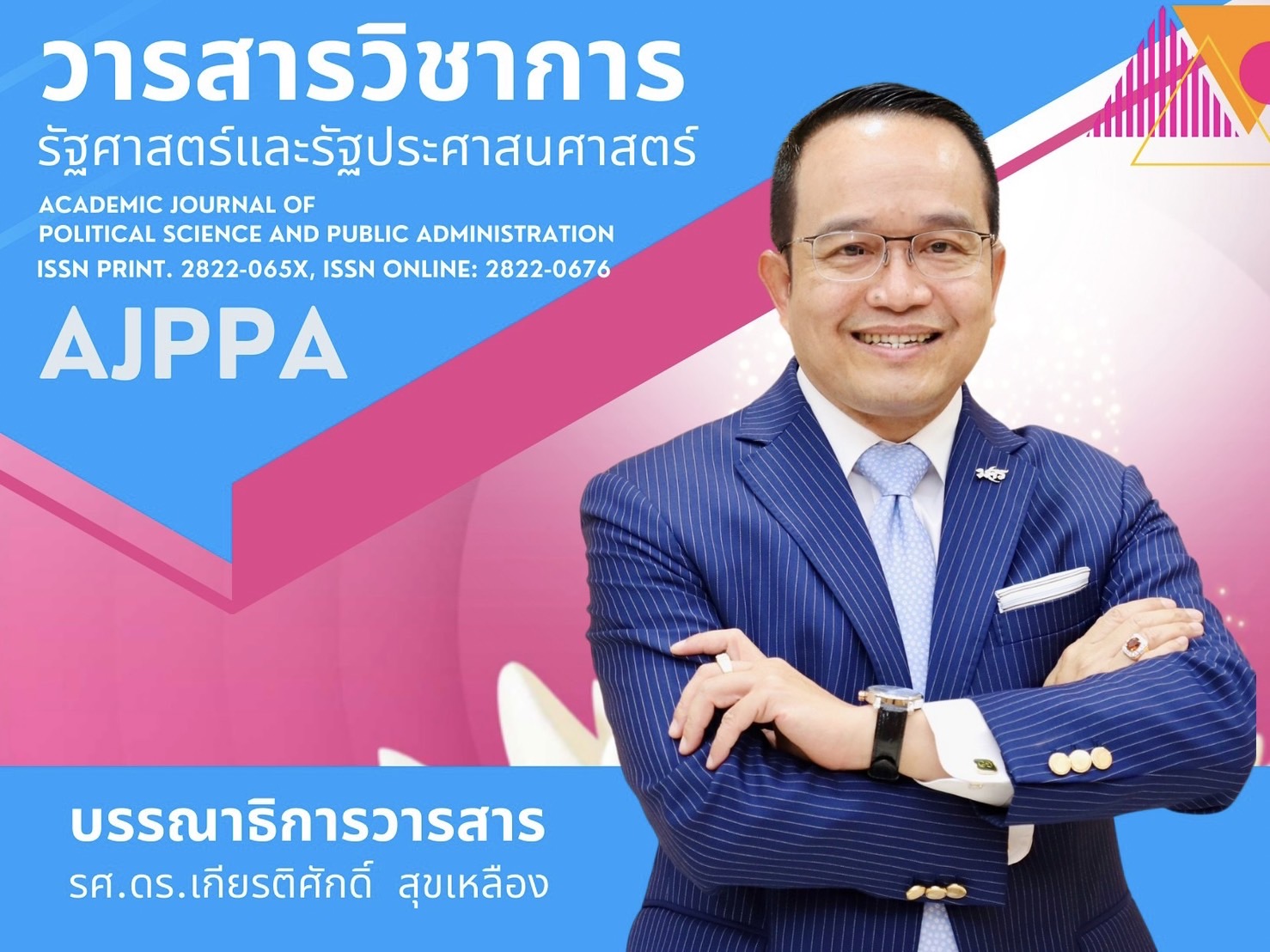มาตรฐานทางจริยธรรม
![]()
บทบาทและหน้าที่ของผู้เขียนบทความ
- ผู้เขียนบทความต้องรับรองผลงานตัวเองว่าไม่เคยตีพิมพ์หรือเผยแผ่ที่ใดมาก่อน
- ผู้เขียนบทความต้องไม่ละเมิดลิขสิทธิ์หรือคัดลอกบทความ หรือผลงานของท่านอื่นมาเป็นผลงานของตัวเองโดยไม่มีการอ้างอิง และต้องผ่านการตรวจโปรแกรมการคัดผลงานทางวิชาการ ด้วยโปรแกรม CopyCat เว็บ Thaijo โดยทางวารสารได้กำหนดค่าไว้ในระดับ ไม่เกิน 15%
- ผู้เขียนบทความต้องมั่นใจในผลงานตีพิมพ์ว่าเป็นผลงานที่ทำการศึกษาจริงและข้อมูลผลงานนั้นๆไม่เป็นเท็จ
- ผู้เขียนบทความต้องปรับหรือแก้ไขผลงานที่ตีพิมพ์เป็นไปตามรูปแบบการจัดพิมพ์และรูปแบบการอ้างอิงแหล่งข้อมูลตามที่วารสารกำหนด
- ผู้เขียนบทความต้องปรับแก้ไขผลงานที่ตีพิมพ์ตามคำแนะนำหรือตามผลการประเมินบทความจากคณะผู้ประเมินบทความของกองบรรณาธิการ หากไม่แก้ไขตามคำแนะนำทางวารสารจะขอสงวนสิทธิ์ไม่ตีพิมพ์บทความของท่าน
- บทคัดย่อทั้งภาษาไทยและภาษาอังกฤษ กรณีที่เป็นบทความวิจัยมีเนื้อหาไม่ซ้ำหรือเหมือนกันกับงานวิจัยเรื่องนั้นๆ
- ผู้เขียนบทความต้องระบุแหล่งที่มาของทุนการสนับสนุนบทความหรือผลงานทางวิชาการให้ชัดเจน (ถ้ามี)
- ผู้เขียนบทความต้องยินยอมให้บทความหรือผลงานที่ตีพิมพ์เป็นลิขสิทธิ์ของวารสารและไม่นำไปตีพิมพ์เผยแผ่ในแหล่งอื่นๆ
- ผู้เขียนบทความต้องแก้ไขบทความตามคำแนะนำของผู้ประเมินบทความอย่างเคร่งครัดหากไม่ หากไม่ดำเนินการแก้ไขตามคำแนะนำและตามเวลาที่กำหนดทางวารสารขอสงวนสิทธิ์ไม่ตอบรับบทความของท่านมาตีพิมพ์และไม่ขอคืนค่าธรรมเนียมการตีพิมพ์ไม่ว่ากรณีใดๆทั้งสิ้น
![]()
บทบาทและหน้าที่ของบรรณาธิการ
- บรรณาธิการมีหน้าที่ควบคุมดูแลการบริหารงานวารสารเป็นไปด้วยความเรียบร้อยตามหลักเกณฑ์ที่ศูนย์ดัชนีการอ้างอิงวารสารวิชาการไทย (TCI) กำหนด
- บรรณาธิการต้องมีจรรยาบรรณหรือใช้เหตุผลทางวิชาการในการพิจารณาบทความโดยไม่มีอคติไม่มีส่วนได้ส่วนเสียต่อผู้นิพนธ์บทความ
- บรรณาธิการต้องยอมรับผลการประเมินบทความจากผู้ประเมินบทความ โดยไม่แก้ไขหรือปรับเปลี่ยนข้อความอื่นๆนอกเหนือที่ผู้ประเมินบทความแนะนำ
- บรรณาธิการไม่มีส่วนได้ส่วนเสียหรือผลประโยชน์ซ้ำซ้อนกับผู้นิพนธ์บทความ
- บรรณาธิการไม่ใช้อำนาจหรือหน้าที่ครอบงำผู้ประเมินบทความให้ประเมินบทความต้องที่ตัวเองต้องการ
- บรรณาธิการไม่ควรตอบรับบทความที่ยังไม่ผ่านกระบวนการประเมินจากผู้ประเมินบทความ
- บรรณาธิการต้องตรวจสอบความซ้ำซ้อนของบทความอย่างจริงจังโดยใช้โปรแกรมที่เชื่อถือได้เพื่อให้แน่ใจว่าบทความหรือผลงานที่นำมาตีพิมพ์ในวารสารไม่มีการคัดลอกผลงานคนอื่น
- บรรณาธิการต้องหยุดกระบวนการประเมินบทความหากเกิดการคัดลอกผลงานผู้อื่น และต้องแจ้งให้เจ้าของบทความทราบทันที หากเจ้าของบทความไม่ปฏิบัติตามคำแนะนำบรรณาธิการสามารถปฏิเสธการตีพิมพ์ทันที
- บรรณาธิการต้องเลือกผู้ประเมินบทความให้มีความรู้ความเชี่ยวชาญตรงกับบทความนั้นๆอย่างเคร่งครัด
![]()
บทบาทและหน้าที่ของผู้ประเมินบทความ
- ผู้ประเมินบทความต้องคำนึงถึงคุณภาพของบทความเป็นหลัก โดยยึดหลักวิชาการและให้ตรงกับวัตถุประสงค์ของวารสาร และต้องประเมินบทความให้เป็นตามรูปแบบการประเมินของวารสารอย่างเคร่งครัดไม่มีอคติใดๆทั้งสิ้น
- ผู้ประเมินบทความต้องมีจรรยาบรรณไม่เปิดเผยข้อมูลหรือผลการประเมินบทความให้แก่ส่วนงานอื่นหรือบุคคลอื่นๆ
- ผู้ประเมินบทความไม่นำเนื้อหาส่วนใดส่วนหนึ่งที่ตนเองประเมินมาเป็นผลงานของตนเองโดยไม่ได้รับการยินยอมจากเจ้าของบทความหรือจากวารสาร
- ผู้ประเมินบทความต้องมีความรู้ความเข้าใจและเชี่ยวชาญในเนื้อหาของผลงานที่ตนเองประเมิน ถ้าไม่เชี่ยวชาญผู้ประเมินสามารถปฏิเสธที่จะประเมินบทความเรื่องนั้นให้บรรณาธิการทราบทันที
- ผู้ประเมินบทความต้องแจ้งบรรณาธิการทราบทันทีหากพบเนื้อหาในบทความที่ตนเองที่ตนเองประเมินมีความซ้ำซ้อนหรือเหมือนกับผลงานของคนอื่น
- ผู้ประเมินบทความต้องประเมินบทความตามแบบประเมินอย่างเคร่งครัดถ้าหากมีข้อเสนอแนะนอกเหนือประเด็นตามแบบประเมินก็สามารถเสนอเพิ่มเติมเป็นลายลักษณ์อักษรให้ชัดเจน
- ผู้ประเมินบทความต้องไม่มีผลประโยชน์ซ้ำซ้อนหรือส่วนได้ส่วนเสียกับเจ้าของบทความนั้นๆ ถ้าหากบรรณาธิการทราบในภายหลังจะขอยกเลิกผลการประเมินนั้นเสียและทางวารสารสงวนสิทธิ์ไม่ส่งบทความให้ท่านประเมินในครั้งต่อไป
- ผู้ประเมินบทความต้องประเมินบทความตามกรอบระยะเวลาที่วารสารกำหนดและต้องส่งบทความที่ทำการประเมินแล้วเสร็จให้กับวารสารภายในไม่เกิน 14 วันนับจากวันที่ได้รับบทความ




